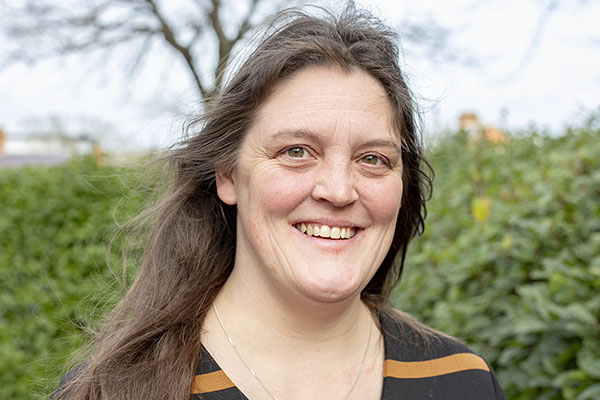Dr Judy Bettridge

Agriculture, Health and Environment Department
Natural Resources Institute, Faculty of Engineering & Science+44 (0)1634 88 3021
Dr Judy Bettridge joined the Natural Resources Institute at the University of Greenwich in February 2020 as a Fellow in Biostatistics for Food and Agriculture. Her research focuses on animal health and the ecology of infections in livestock production systems. Judy’s work is largely interdisciplinary and tries to integrate multiple data types and measurements to describe the drivers and dynamics of complex agro-ecologies. Her previous research roles have included research associate positions on the UrbanZoo and Chicken Health for Development projects with the University of Liverpool and the International Livestock Research Institute, and a stint as a Senior Epidemiologist at the Animal and Plant Health Agency.
Judy has worked on a variety of pathogen and livestock species, including antimicrobial resistance, Salmonella, E. coli, bovine TB and TSEs, but she is particularly interested in poultry and small livestock keeping in East Africa, and in urban farming systems. Her previous work uncovered the potential interaction between anthropogenic and natural drivers for the evolution of different genotypes and production systems for village chickens, and she is keen to undertake more work to better understand the anthropogenic aspects and incorporate more social science theory and methodology into the biological models.
Dr Judy Bettridge is interested in understanding the anthropogenic aspects and drivers of the epidemiology of animal diseases and incorporating more social science theory and methodology into biological models.
Her previous work explored the potential interaction between anthropogenic (socio-cultural and marketing factors) and natural (climate, population dynamics and pathogen burden) factors which appear to have driven the evolution of quite different and locally-adapted genotypes and production systems for scavenging village chickens in Ethiopia. This has implications for livestock intensification and development programmes, which are often delivered at the national level, and may explain why they do not achieve universal success.
Her post-doctoral work in Kenya consisted of managing epidemiological sampling of a diverse range of socio-economic urban household environments for a large landscape genetics study of E.coli and gathering associated data to classify the different ecological niches. This work laid the foundations for other studies, including the distribution of antimicrobial resistance on urban wildlife, work on other pathogens, such as MRSA and Campylobacter, and the examination of bacterial genetics within the beef and pork value chains.
Judy is also interested in applied research. During her time in the civil service, she worked on a couple of projects looking at ways to integrate whole genome sequencing into everyday surveillance for animal diseases. She is keen to take this work further, and look at its potential application in LMICs, where simplified techniques for using genomic data in disease surveillance could have considerable value.
Judy is part of the Sustainable Agricultural Intensification research programme at NRI.
Dr Judy Bettridge worked as a postdoctoral research associate on the UrbanZoo project, which investigated the epidemiology, ecology and socio-economics of disease emergence in Nairobi. Using E. coli as a model pathogen, the project studied the connectedness of ecological niches (human, livestock, wildlife, food and environment) across a range of socio-economic strata, to try and identify potential “hotspots” for future disease emergence, and the flow of animal source food products around the city using value chain analyses. Waste management, of both household rubbish and animal manure, was identified as a potential risk factor for the sharing of bacterial genes conferring resistance to antibiotics and is a target for future research.
The Chicken Health for Development project explored the economics, disease and production constraints, and genetics of scavenging chickens in Ethiopia. Previous programmes in the country for improving the profitability of small-scale chicken production have focused largely on exchanging indigenous chickens for high-producing exotic or cross-breeds; our research concentrated on the possibilities for improvement of the existing birds and systems. We demonstrated that the main reported disease, “Fengele” (normally assumed to be Newcastle Disease), was likely to be caused by several different infections and co-infections. We also demonstrated that both birds and farming systems were adapted to the local natural and cultural environments, and therefore sustainable interventions needed to be equally flexible.
- Hassell, James M., Ward, Melissa, Muloi, Dishon, Bettridge, Judy M., Robinson, Timothy P., Kariuki, Sam, Ogendo, Allan, Kiiru, John, Imboma, Titus, Kang’ethe, Erastus K., Öghren, Elin M., Williams, Nicola J., Begon, Michael, Woolhouse, Mark E.J. and Eric Fèvre, Eric M. (2019) Clinically relevant antimicrobial resistance at the wildlife–livestock–human interface in Nairobi: an epidemiological study. The Lancet Planetary Health, 3 (6). e259-e269. ISSN 2542-5196 (doi:https://doi.org/10.1016/S2542-5196(19)30083-X)
- Bettridge, Judy M., Psifidi, Androniki, Terfa, Zelalem G., Desta, Takele T., Lozano-Jaramillo, Maria, Dessie, Tadelle, Kaiser, Pete, Wigley, Paul, Hanotte, Olivier and Christley, Robert M. (2018) The role of local adaptation in sustainable production of village chickens. Nature Sustainability, 1 (10). pp. 574-582. ISSN 2398-9629 (Online) (doi: 10.1038/s41893-018-0150–9)
- Awarded the N.E. Roberts prize (2014, University of Liverpool Institute of Infection and Global Health)
- Member of the Society for Veterinary Epidemiology and Preventive Medicine and the British Veterinary Association

